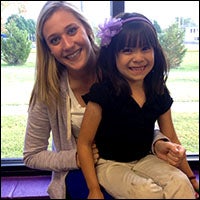Nutrition students develop their professional leadership styles

Students detail their analyses of Pitt County areas to Sandra Spann (left), president of Food Systems Consultants. Spann was one of the experts who spoke with the class during their project designed to enhance leadership skills. (Contributed photos)
By Nicole Wood
College of Human Ecology
East Carolina University nutrition science professor Brenda Bertrand engaged 35 students last semester in a project designed to enhance their leadership skills.
The students teamed up to conduct “windshield tours” of Pitt County, using photography to document their research. The students examined health issues including whether areas were equipped for walkers or bikers and whether grocery stores or convenience stores were in close proximity to neighborhoods and schools.
Students then considered the implications of their findings and what those results would mean for the studied locations, which included Farmville, Chicod, Grimesland, Ayden and Stokes. They developed diagrams to chart the strengths, weaknesses, opportunities and threats (SWOT) in those areas.
When the teams shared their diagrams with the entire class, a trend emerged. “They began to notice similarities between the different communities,” said Elizabeth Kroeger, graduate assistant for the course. “They each saw limited access to fresh fruits and vegetables with community and geographical constraints for shopping (distance or lack of grocery stores) and transportation (lack of sidewalks).” The teams then collaborated to combine their findings into an SWOT diagram for all of Pitt County.
Representatives from the studied communities visited the class to help students develop new ideas and intervention plans that are feasible for real-world application. Nutrition experts worked with the students throughout the process and visited campus to share their perspectives on the students’ plans.

Graduate student Elizabeth Kroeger, left, is gathering data from the nutrition students’ project as part of her own research project. Kroeger is pictured with one of the students at the Pitt County Boy’s and Girl’s Clubs, where she also works.
The students created a blog detailing their project and their own understanding of leadership in rural health. Along the way, students read articles regarding transformative leadership – a type of leadership that has ideal traits for working within the nutrition field. They answered questions about the articles on their blogs. Students also took questionnaires that identified their leadership traits at the beginning and end of the project.
While the students gathered data on the communities, Kroeger gathered details on the students’ learning process and leadership transformation. She will use the data for a graduate research project to determine whether the students’ leadership styles changed throughout the project.
“The qualitative research we collected of the students’ perspectives on the leadership projects (and) leadership in general will be used to prepare a manuscript for a journal submission in 2014,” said Kroeger. “Hopefully, our research will give professors in the field of nutrition insight into how to effectively develop leadership skills among their students.”
The project was sponsored in part by a BB&T Leadership Grant. Those grants aim to advance ECU’s culture of service and its place as a leadership development community by encouraging and assisting units across campus to embed leadership development components into their courses and programs.
